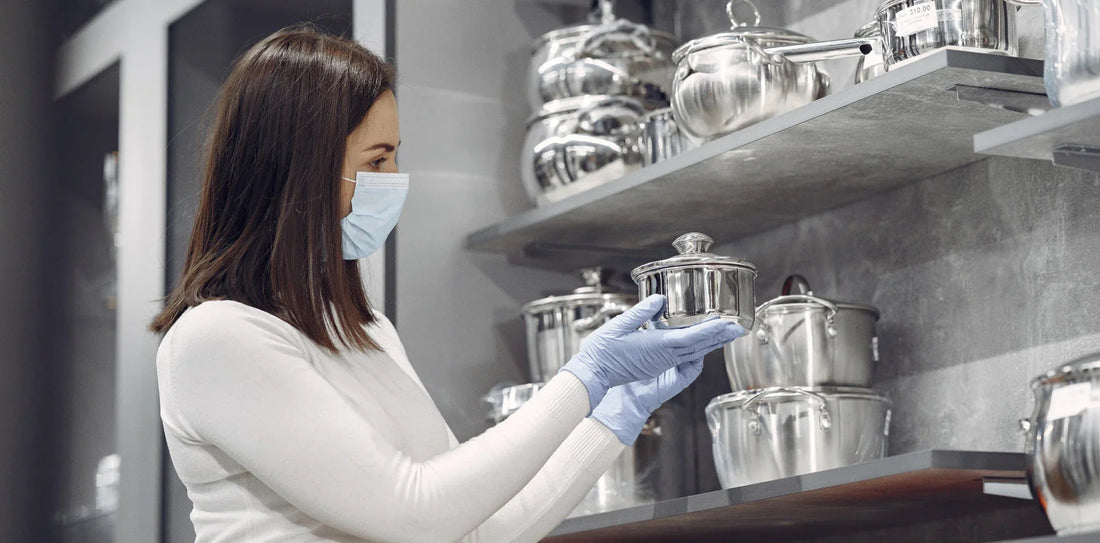
How to Choose the Best Cookware for Your Kitchen: A Complete Guide
Share
Choosing the right cookware for your kitchen can be overwhelming, given the variety of materials, coatings, and styles available. Whether you’re an aspiring home chef or just looking for the best pots and pans for everyday cooking, selecting the right cookware will make your culinary experience more enjoyable and efficient. In this guide, we’ll break down everything you need to know about cookware, from materials to maintenance, helping you make an informed decision.
1. Understand Your Cooking Needs
Before purchasing cookware, consider your cooking habits. Ask yourself:
- What types of dishes do you cook most often? Some materials are better for specific cooking methods.
- Do you prefer nonstick surfaces? If you cook delicate foods like eggs and pancakes, nonstick pans might be ideal.
- Are you looking for longevity? Some cookware materials, like stainless steel and cast iron, can last a lifetime.
- Do you cook on gas, electric, or induction? Some cookware materials, like aluminum, don’t work on induction stovetops unless they have a magnetic base.
2. Types of Cookware Materials
Different cookware materials offer unique benefits and drawbacks. Let’s explore the most popular options:
a) Stainless Steel Cookware
Pros:
✔ Durable and long-lasting
✔ Non-reactive (won’t affect food taste)
✔ Compatible with all stovetops, including induction
✔ Oven-safe and dishwasher-friendly
Cons:
✖ Can cause food to stick unless preheated properly
✖ Requires oil or butter for cooking
Best for: Searing, browning, boiling, and everyday cooking.
b) Nonstick Cookware
Pros:
✔ Easy to clean
✔ Requires less oil for cooking
✔ Ideal for delicate foods like eggs and pancakes
Cons:
✖ Not as durable as other materials (coating may wear off over time)
✖ Can’t withstand very high heat
✖ Some coatings (like Teflon) may release harmful fumes if overheated
Best for: Low-fat cooking, eggs, pancakes, and stir-frying.
c) Cast Iron Cookware
Pros:
✔ Excellent heat retention and even cooking
✔ Can last for generations if properly maintained
✔ Naturally nonstick when seasoned correctly
Cons:
✖ Requires seasoning and maintenance to prevent rust
✖ Heavy and takes time to heat up
✖ Not ideal for cooking acidic foods (tomatoes, vinegar-based dishes)
Best for: Searing meat, frying, baking, and slow cooking.
d) Carbon Steel Cookware
Pros:
✔ Lightweight compared to cast iron
✔ Develops a natural nonstick surface over time
✔ Great for high-heat cooking
Cons:
✖ Requires seasoning and maintenance
✖ Can rust if not properly cared for
Best for: Stir-frying, high-heat searing, and making crepes.
e) Copper Cookware
Pros:
✔ Excellent heat conductivity for precise cooking
✔ Beautiful and stylish appearance
Cons:
✖ Expensive
✖ Requires polishing to maintain its look
✖ Can react with acidic foods unless lined with stainless steel
Best for: Sauces, precise temperature control cooking, and professional kitchens.
f) Aluminum Cookware
Pros:
✔ Affordable and lightweight
✔ Heats up quickly
✔ Often comes with nonstick coatings
Cons:
✖ Prone to scratching and denting
✖ Can react with acidic foods unless anodized
Best for: Budget-friendly cookware for general use.
3. Essential Cookware Pieces for Every Kitchen
If you’re setting up your kitchen or upgrading, here are the must-have cookware items:
- Frying Pan (Skillet): Great for frying, searing, and sautéing.
- Saucepan: Ideal for boiling, making sauces, and reheating.
- Stockpot: A must-have for soups, stews, and pasta.
- Dutch Oven: Perfect for slow cooking, baking, and braising.
- Grill Pan: Useful for indoor grilling.
4. Choosing the Right Cookware for Your Stovetop
Different stovetops work best with certain cookware materials:
- Gas Stove: Works well with all types of cookware.
- Electric Stove: Flat-bottom cookware is best for even heat distribution.
- Induction Stove: Requires magnetic materials like stainless steel or cast iron.
5. Maintenance Tips for Long-Lasting Cookware
To extend the life of your cookware, follow these tips:
- Stainless Steel: Use warm water and mild detergent. Avoid harsh abrasives.
- Nonstick: Hand-wash with a soft sponge to protect the coating.
- Cast Iron: Season regularly and avoid soaking in water.
- Copper: Polish frequently to prevent tarnishing.
- Aluminum: Hand-wash anodized aluminum to maintain its finish.
Final Thoughts
Investing in the right cookware will enhance your cooking experience and save you money in the long run. Consider your cooking style, stovetop compatibility, and maintenance preferences when choosing cookware. With the right pieces, you’ll be able to prepare delicious meals with ease and confidence.